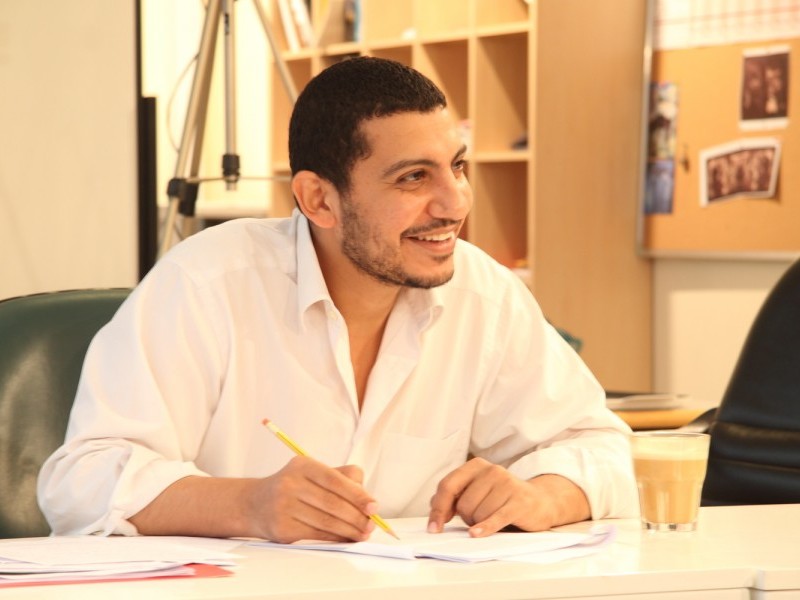Al Araba Al Madfuna I (2012) and Al Araba Al Madfuna II (2013), the first two parts of a film trilogy, reflect Wael Shawky’s long-time interest in using existing literature and histories from Arab culture to create new forms of cinematic and performance art. He brings into dialogue real and imagined histories of the Arab world in provocative retellings that pose timely questions about truth and fabulation.
In both films, children dressed as grown men, in turbans and with glued-on mustaches, retell stories by Egyptian novelist and short story writer Mohamed Mustagab (1938–2005)—their speech dubbed in the voices of adults. Shot in black and white in the tradition of classic Egyptian movies, these two multi-layered films were inspired by the artist’s experience with residents of the village of Al Araba Al Madfuna, which is located near the ruins of Abydos, one of the oldest cities in Upper Egypt. After Shawky witnessed village residents digging in the ground for hidden pharaonic treasures and appealing to spirits to help them in their search, he began to explore how the ideologies and behaviours of earlier generations could be carried on, sometimes in extreme ways, by their descendants.
In Al Araba Al Madfuna I, Shawky draws on a story by Mustagab about a dying tribal leader whose tribe blindly follows the guidance of his ‘last word’ to worship certain animals. Al Araba Al Madfuna II retells Mustagab’s parables ‘Horsemen Adore Perfumes’ and ‘The Offering’.
Winner of the Ernst Schering Foundation Art Award (2011), Shawky was commended by the jury for his work in film, which they characterised as ‘remarkably impressive due to its consistent development and extraordinary precision. His re-performances of historical and political events ignite unconventional perspectives, which exceed reflections of Egyptian societal structures. He creates images that are crafted with technical mastership and therefore induce an immediate persuasiveness.'
Shown in Sharjah Biennial 11 (2013), Al Araba Al Madfuna I premiered as part of a solo exhibition at the KW Institute for Contemporary Art, Berlin (2012). Al Araba Al Madfuna II, co-produced by Sharjah Art Foundation and the Wiener Festwochen, premiered at the Serpentine galleries, London (2013). It was also featured in the solo exhibition Wael Shawky: Horsemen Adore Perfumes and other stories at Sharjah Art Foundation in 2014. Al Araba Al Madfuna I and II are part of the Sharjah Art Foundation Collection.
In 2013 Shawky was awarded the Sharjah Biennial 11 Prize for his performance and installation work Dictums 10:120 (2011–2013). His major theatrical performance The Song of Roland: The Arabic Version (2017), co-produced by Sharjah Art Foundation, premiered at the Theatre del Welt, Hamburg, in 2017. Following later in the year were performances at the Holland Festival, Amsterdam; Zürcher Theater Spektakel, Zurich; and Onassis Cultural Centre, Athens; and in 2018, the work was presented at the Foundation. Selections from his drawing and installation series ‘Gulf Project Camp’ were shown in Sharjah Biennial 14 (2019).


